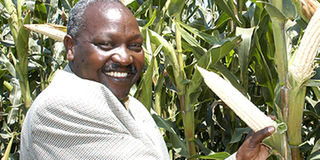Premium
Forum calls for links among agriculture app developers

A farmer tends to his scrops.In Kenya, there has been a proliferation of ICT applications across different platforms — web, mobile, and radio — equipping farmers with access to timely information on prices, markets, and production in a bid to weed out middlemen. Photo/FILE
What you need to know:
- In Kenya, there has been a proliferation of ICT applications across different platforms — web, mobile, and radio — equipping farmers with access to timely information on prices, markets, and production in a bid to weed out middlemen.
- Kenya’s MFarm app, for instance, uses simple data to “m-Power” farmers, according to Ms Susan Oguya, a co-founder.
Technology is increasingly playing a key role in transforming agriculture in East Africa, although industry players are calling for more collaboration if they are to get the most out of the applications.
At a recent ICT for agriculture forum held in Rwanda, the director of the Centre for Technical Cooperation of Agriculture, Mr Michael Hailu, said closer cooperation between farmers, extension workers, and software developers is necessary if production is to be enhanced. Such links would stem duplication of farming apps.
“To achieve full potential, smallholder farmers must be assisted to transform their activities from subsistence to profitable sustainable businesses, and ICTs can play a key role in this transformation and collaboration,” said Mr Hailu.
Noting that ICTs are now regarded as the “low-hanging fruit for poverty reduction,” Rwanda’s minister for Agriculture and Animal Resources, Ms Agnes Kalibata, said agricultural apps are creating a revolution in farming — from extension to marketing, to agro-input services, to banking and financial services and to certification management.
She said closer collaboration between farmers, app developers, research institutions, markets, and other actors would provide an avenue for provision of necessary information and extension services.
In Rwanda, for instance, the government is working closely with smallholder farmers in the use of the E–soko web and mobile application platform which provides growers with data on markets, production practices, and the weather, enabling them to enhance efficiency.
Through its extension services, the country has also equipped thousands of farmers with basic knowledge on the use of such an application with over 2.5 million people signing up.
PROLIFERATION OF ICT APPLICATIONS
In Kenya, there has been a proliferation of ICT applications across different platforms — web, mobile, and radio — equipping farmers with access to timely information on prices, markets, and production in a bid to weed out middlemen.
Kenya’s MFarm app, for instance, uses simple data to “m-Power” farmers, according to Ms Susan Oguya, a co-founder.
She said it has created “armchair farmers” and drawn the youth into the business as producers, marketers, input suppliers, or content developers, many of whom work in a collaborative way to ensure successful transactions and transmission of information.
MFarm is also engaged in partnerships with exporters, producers, agents, and telecom firm Safaricom to enable small-scale farmers to access markets, and production and weather information.
hrough such ties, the application is now able to generate income through successful transactions between producers and buyers.
The app also sells data to television and community radio stations and research institutions.
Besides this, it accepts adverts from producers and buyers on its platform as part of the collaboration that is now earning it extra income.
TRANSPARENCY
Recently, the programme received Sh20 million from Safaricom as part of the cooperation to increase transparency.
There are also many apps cutting across borders, for instance, Ghana’s Esoko, which provides farmers with access to information on market prices, weather forecasts, agricultural tips, bids, and offers.
It is used by farmers across 16 African countries including Kenya, Uganda, Tanzania, Burundi, Burkina Faso, Cameroon, Ivory Coast, Madagascar, Malawi, Mozambique, Nigeria, Rwanda, Swaziland, Zambia and Zimbabwe.
“The purpose of the application is to put more money in smallholder farmers’ pockets,” Mr Mark Davies, Esoko’s chief executive, said in an interview.
Its use has seen returns to many smallholders increase by between 10 and 15 per cent annually: “Some have gained as much as 500 per cent in returns on improved prices,” he noted.
Many other apps include iCow from Kenya, Kinu from Tanzania, Farmerline from Nigeria, Trac FM from Uganda, Rural eMarket from Madagascar, and AGRICO from Burkina Faso. All these target smallholder farmers by providing information on production practices, inputs, prices, markets, and weather information.
Some apps are tailor-made to run on mobile and the web to expand access to finance, connect sector stakeholders, enhance farmers’ creditworthiness, collect and share market data, and link and engage the youth along the value chain.




